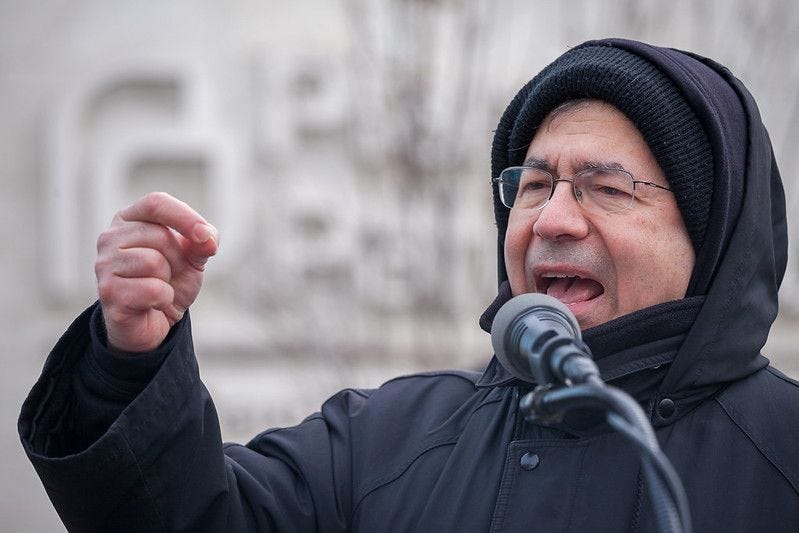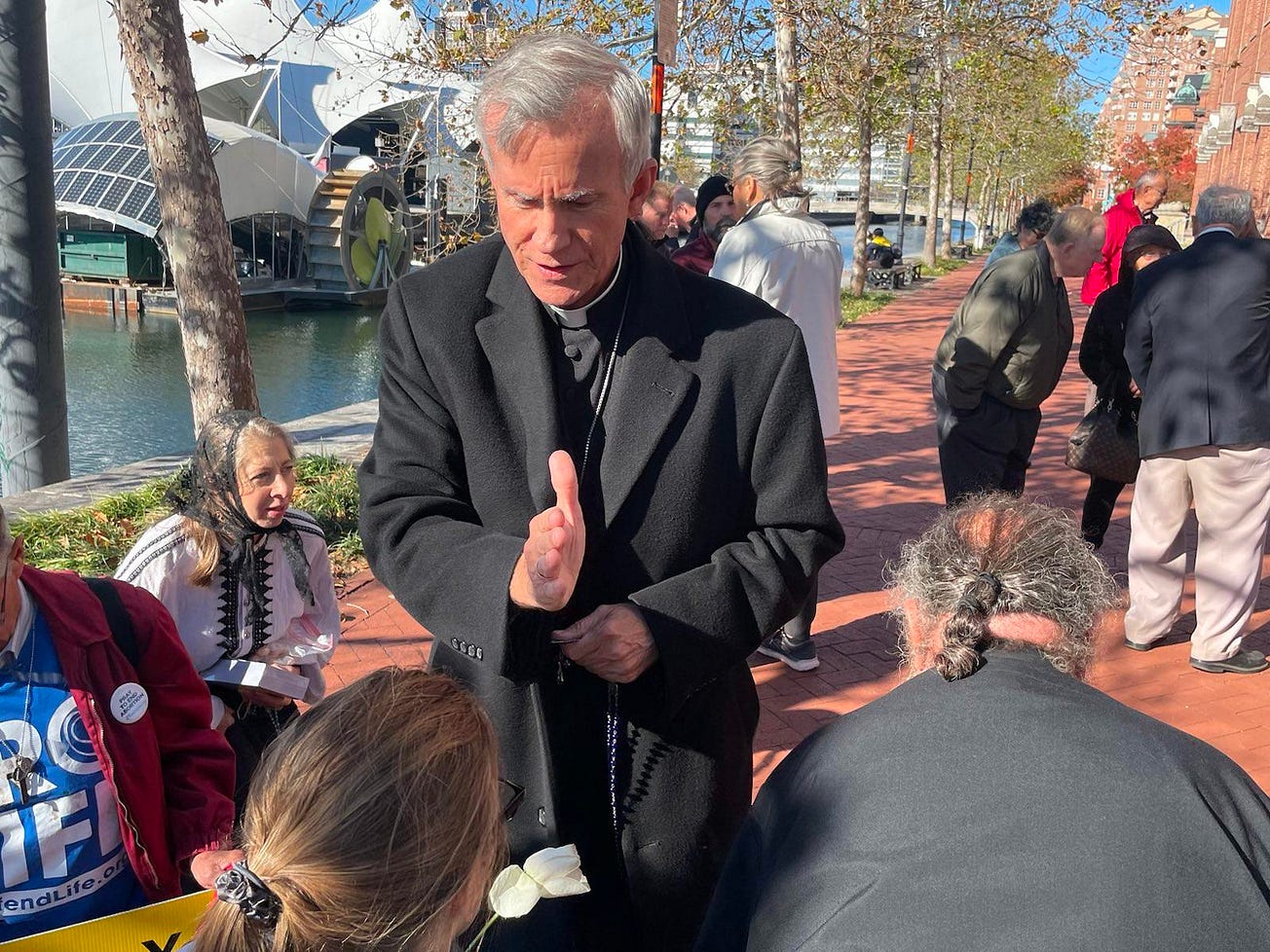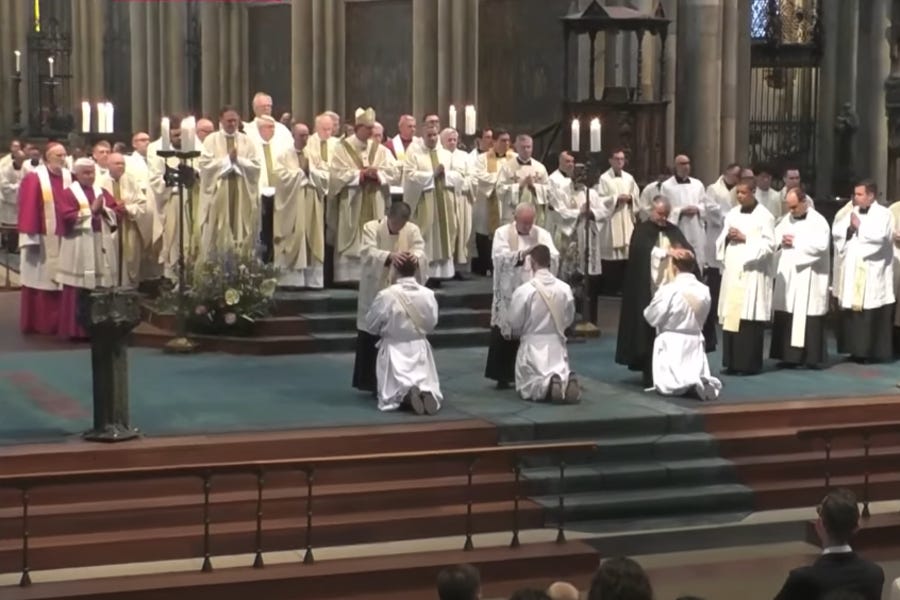
A former employee says she was serially sexually harassed by Priests for Life director Frank Pavone, while Pavone himself acknowledged that he's faced sexual misconduct allegations in the past.
The woman told The Pillar that she reported Pavone's harassment both to Priests for Life officials - who excused Pavone's behavior - and to the Diocese of Amarillo, while Pavone was still incardinated there as a cleric.
For his part, Pavone told The Pillar Wednesday that he is “saddened” by recent reports which “revisit old accusations that contain numerous inaccuracies, misrepresentations, and mistruths.”
Those allegations, Pavone claims, “have already been addressed.”
—
Mary Worthington was an employee of Priests for Life from 2004, when she graduated college, until the summer of 2006.
Worthington contacted Priests for Life as a college senior, because she had heard the organization helped young pro-life activists find jobs at pro-life organizations across the country. She said she was surprised when she was offered a job at Priests for Life’s own headquarters in New York, and - even before the salary or other details were explained to her - Worthington accepted.
Worthington told The Pillar that Priests for Life offered her the use of an apartment in New York, and a chance to work for an end to abortion. But soon after she arrived, she said, a junior staffer at Priests for Life quit, and encouraged her to quit as soon as she could.
“He told me ‘This place is insane,’” Worthington alleged. “He said, ‘I want nothing to do with it.’”
She stayed.
But Worthington said she noticed quickly that some things at work were unusual. She said that Pavone was laser-focused on efficiency in the office, even criticizing staffers who arrived a few minutes late because they had been at daily Mass or adoration.
And then, she alleged, “[Pavone] started on the flirty-flirty touching, paying way too much attention to me, touching my hair, or stroking my back. He’d reach around me to type emails, leaning over me, on top of [my arms] — and it was continuous. It was just creepy,” Worthington alleged.
“He would just walk up to me in the office, and keep his hand on my arm, stroke my hair at my desk, or put his hand on the small of my back, where it was also halfway on my bottom,” she said.
“He would call me into his office and give me special projects to do, which were just made up things to have me in his office.”
When Worthington worked at Priests for Life, Pavone’s living quarters were connected to his office.
“He kept file cabinets in his bedroom, and he’d have me filing things in his bedroom, which felt completely inappropriate. Especially because he’d try to make me his little pet — he’d call me his ‘favorite college student,’ and when I’d say that I’d graduated, he’d say, ‘That’s so cute, you’re my favorite college graduate.’”
“All of this was horrible, and it was completely inappropriate,” Worthington said, “but it could have been so much worse.”
Worthington said the “constant” harassment got to her.
She recalled that Pavone “would have me drive him to the airport … and he would touch my legs.”
“And I always just sat there cringing, thinking ‘Don’t touch me. Just please don’t touch me.’”
Eventually, she said, “I became so overwhelmed and so stressed out. My hair turned gray. I dreaded being with him in the office. It was like: ‘How do I make this guy go away?’ I felt disgusting being there.”
Worthington said she decided to quit her job in 2006, after an incident in which Pavone “had me backed up against a wall, and was stroking my hair, and stroking my shoulder. And he was trying to tell me to go downstairs and get his camera or something, but he was standing way too close to me. And I wonder why I didn’t knee him in the groin,” she said.
She quit soon after.
Before she quit the job, Worthington said, she told her father what had happened.
“I told him, ‘Dad, Pavone’s been making advances at me for two years now, almost. I can’t take it anymore, and I’m sick of this.”
According to Worthington, her father called Anthony DeStefano, Priests for Life’s executive director, and complained about Pavone’s behavior.
“And DeStefano told my dad that I didn’t understand, and that [Pavone] was just very affectionate,” she claimed.
Pavone mostly avoided her after that call, Worthington said. But she had already decided to quit, and resigned a few weeks later. After she left, she said Priests for Life continued to pay her.
“Anthony DeStefano continued to give me paychecks for three months. Because he said I had worked so hard and dedicated so much of my time to Priests for Life.”
“He said: ‘We want to be sure that you’re able to move on to the next chapter of your life without having to rush,’” she alleged.
In response to questions about Worthington’s allegations, Pavone told The Pillar that: "I am enormously saddened by recent efforts of some to revisit old accusations that contain numerous inaccuracies, misrepresentations, and mistruths, that have already been addressed.”
“Over a decade ago, my bishop at that time thoroughly investigated these claims and confirmed that I was in good standing and fully suitable for ministry.”
“Throughout the past 34 years of my service, it has always been my intent to treat every person with respect, integrity, and professionalism. Of course, I’m sure there have been times in my life where I’ve somehow missed the mark and unintentionally made someone feel uncomfortable. I’m sorry to anyone who might have ever taken offense in such moments, and I have always faithfully served the priesthood,” Pavone added.
“I remain focused on the enormously vital work of Priests for Life. As always, we remain steadfast in our mission to expand and protect the sanctity and gift of life. We are saving lives and making significant gains in our unstoppable efforts to make abortion unthinkable.”
The priest did not delineate the specific “inaccuracies, misrepresentations, and mistruths” in the allegations made against him.
—
As she prepared to leave Priests for Life, and after she left, Worthington told friends about what she experienced.
Michaela Rodriguez was Worthington’s college roommate, and a longtime friend.
She told The Pillar that Worthington emailed her frequently during her time at Priests for Life.
“And her emails were bizarre, because she would always talk about Father Frank’s mood, whether he was in a good mood that day or a bad mood or whatever.”
“But then at some point it became frantic — she was emailing everyone to help her find a new job, because she needed to get out of there,” Rodriguez recalled.
After Worthington left Priests for Life, she spent a lot of time at Michaela’s house, her friend remembered.
“And then after she left, when she was visiting me, she told me that he was very inappropriate when she worked there and she was very uncomfortable. She never disclosed exactly what happened. She just said that it had been very inappropriate.”
“After that, if you ever mentioned Priests for Life, she was very skittish and very negative.”
A few years later, Rodriguez recalled, “she was going to write a report to the bishop, and then she told me that she had written a report to the bishop.”
“It was very clear to me that something horrible had happened,” Rodriguez said, but Worthington didn’t open up about the details.
Still, Rodriguez recalled that even years later, when in 2009 Worthington planned to join a religious order, “something was still wrong. It still felt very much like something was wrong.”
Start your day with Starting Seven - a daily news roundup in your inbox.
Another woman, who was an intern at Priests for Life while Worthington was employed there, told The Pillar that, “[Worthington] confided in me that Pavone made her very uncomfortable, that Pavone was constantly touching her arm, her hair, showering her with compliments, and just that she felt very uncomfortable around him.”
“She felt that she had to stay and work there because of financial necessity. But the next summer, while I was beginning my second summer as an intern, she was leaving, and she was agitated, but didn’t tell me exactly what had happened because she was so upset about it.”
But soon after Worthington left the position, “she told me about how she had been cornered and felt trapped, and just how scared and uncomfortable she was when he had cornered her and was stroking her hair. That was the final incident, at which time she felt things had become pretty egregious.”
The woman, who requested anonymity to protect her privacy, told The Pillar that she eventually had her own experience, which she called a “red flag of inappropriate behavior.”
“There was one day in which all the rest of the staff had gone home, but Pavone had asked me to stay to help with something … Through his office was a door to his private quarters, and so he led me from his office, into his private quarters.”
“And I don’t even remember what the project was, it was actually pretty insignificant, and there was no reason why it had to be done in his private quarters. So he kind of hung around in the private quarters while I worked on this project there … and being a young 20-something, it felt weird to me, but I couldn’t really articulate why. And I can see now that it was completely inappropriate to be alone with a young woman in your private quarters — or with any employee really.”
“There was zero reason the work couldn’t have been done in his office. And looking back on that, I see that it was really inappropriate, and I’m just glad that nothing more followed from it.”
📰
—
Worthington told The Pillar that after she resigned in the summer of 2006, she talked with Theresa Burke, the founder of Rachel’s Vineyard, a post-abortion healing ministry, which was acquired by the Priests for Life organization in 2003.
“I sat in her office, and I told her everything, and she’s like, ‘I know you’re not the first one,’” Worthington alleged. But it is not clear whether Burke reported the allegation to other Priests for Life officials.
For her part, Worthington emphasized that “the work of Rachel’s Vineyard is really important — so important.”
But Worthington said she believed that Rachel’s Vineyard’s financial relationship with Priests for Life might have made it difficult for Burke to intervene.
“They weren’t able to fundraise efficiently for their work,” Worthington said, “and [Pavone] bailed them out. And so they’re stuck. And they’re still stuck.”
Burke did not respond to emails from The Pillar.
—
Later in 2006, Worthington said, she attempted to report her experience to the Archdiocese of New York, but she alleges that she was told the archdiocese could not take a report because Pavone was not incardinated there.
“That was just such a blow. But then in 2009, when I entered religious life, I told everything to the superior of the convent I was entering. I felt like if I was going to be a religious sister, I had to tell the superior what had happened to me, because it has to do with clergy. And she told me I should make a complaint letter, and she would help me do it,” she recalled.
“So she found out who to contact at the Diocese of Amarillo, and I wrote this huge complaint letter that I don’t have anymore, and I got a phone call back from a deacon in the diocese, who had questions about what I had written.”
“But he asked if [Pavone] ever put his hands under my clothing, and if I was a minor when it happened. And he just said that I was of age, and that was pretty much it,” she alleged.
The Diocese of Amarillo has not responded to questions from The Pillar. Worthington told The Pillar that she has attempted in recent weeks to obtain a copy of her 2009 report about Pavone, but said the diocese has not yet given her a copy.
“When I left the monastery, I wrote a letter to the diocese and told them that I just wanted to inform them of my status change and location, and that if Frank Pavone ever travels to my diocese, I would like a communication so that I could be sure to avoid him.”
“But of course, later, when he came to [her diocese], they didn’t tell me. And he came to give a speech at the place where I worked, so I had to take the day off.”
📰
—
Worthington is the second woman in recent weeks to allege that she faced inappropriate behavior while she was a junior employee at Priests for Life.
In January, a woman told The Pillar that Pavone had inappropriately touched her, groomed her, and made unwanted sexual advances toward her when she was a young assistant at Priests for Life in the late 1990s, while she was taking a break from undergraduate studies — and shortly before she entered religious life.
That woman, too, filed a report with the Diocese of Amarillo, which alleged that Pavone would rub her back and stroke her hair— and that he made an unwanted visit to her hotel room during a Priests for Life trip, during which he allegedly sexually propositioned her.
The Pillar confirmed that other women had also made complaints to the Amarillo diocese about Pavone.
When that story was reported, Leslie Palma, a spokesperson for Pavone told The Pillar that:
“Any complaints Fr. Frank was made aware of were handled with respect for all involved and under the supervision of the bishop of Amarillo, and were resolved satisfactorily. The bishop expressed confidence in Fr. Frank’s good character and suitability for ministry, as these letters of good standing indicate.”
Palma asked The Pillar to cite 2010 and 2014 letters of good standing issued by the Amarillo diocese, which said that Pavone had “never been involved in an incident which called into question his fitness or suitability to fulfill the responsibilities and duties of his priestly ministry due to alcohol, substance abuse, violation of celibacy, physical abuse, or other causes.”
The letters added that Pavone had “not manifested behavioral problems in the past that would indicate he might deal with minors in an inappropriate manner.”
The 2014 letter explained that Zurek would permit Pavone to temporarily exercise ministry in the Archdiocese of New York. And on the same date that letter was issued, Zurek issued another directive which prohibited Pavone from “any form of broadcast” in media or social media.
It is not clear how the Diocese of Amarillo, where Pavone was incardinated from 2005 until his 2022 laicization, actually investigated the allegations against the priest.
In the years before Pope Francis promulgated Vos estis lux mundi in response to the Theodore McCarrick scandal, clerical sexual misconduct involving adults was usually treated in the Church as a moral failing, but not a canonical crime — even if the cleric had a relationship of supervisory or spiritual authority over the other involved party.
The Vatican has in recent years revised canon law to broaden prohibitions on clerical sexual misconduct against adults, but experts have said the Church continues to insufficiently address the charge of sexual coercion, manipulation and harassment of adults.
But even before the Church’s law was changed, canon law provided that “a cleric who persists with scandal in another external sin against the sixth commandment of the Decalogue is to be punished by a suspension. If he persists in the delict after a warning, other penalties can gradually be added, including dismissal from the clerical state.”
The Amarillo diocese has not responded to phone calls and messages from The Pillar.
After The Pillar’s report last month on allegations against Pavone, OSV News reported Jan. 28 that Father Stephen Imbarrato, a Priests for Life staffer from 2015 to 2018, “had counseled one staffer for more than two years over sexual harassment she had allegedly experienced from Pavone.”
The Pillar confirmed that woman was neither Worthington nor the woman who spoke with The Pillar last month, indicating that at least three women have formally accused Pavone of sexual harassment or misconduct.
—
Pavone’s laicization became public late last year, after a letter to U.S. bishops from apostolic nuncio Archbishop Christophe Pierre was published online Dec. 17.
In the Dec. 13 letter, Pierre noted that Pavone is a longtime high-profile figure associated with the right-to-life movement, adding that his laicization “may, therefore, be a matter of interest among the faithful.”
In light of that “potential interest,” the nuncio sent to the bishops a brief statement from the Vatican’s Dicastery for Clergy, which said Pavone had been laicized after “canonical proceedings” found him guilty of “blasphemous communications on social media, and of persistent disobedience of lawful instructions from his diocesan bishop.”
The Vatican’s statement said that Pavone had been given “ample opportunity” to defend himself, and was given several chances to accept his bishop’s authority but had not done so and had given “no reasonable justification for his actions.”
While both Pavone and some supporters have suggested his laicization was a kind of political persecution because of the former cleric’s pro-life convictions, a 2017 letter to Pavone from Bishop Zurek alleges a broad pattern of disobedience.
“Frank, you are incorrigible,” Zurek wrote.
“You have no respect for me, my office, my authority, my oversight. …I have been dealing with your disobedience and scandalous behavior for years. There is nothing more I can do with you.”
After his laicization, Pavone remains the national director of Priests for Life, a national pro-life apostolate, which in turn supports Rachel’s Vineyard post-abortion healing retreats, manages a publishing division, engages in television production work, and livestreams daily Masses.
Since 2016, Pavone has posted tweets, Facebook statuses, videos, and other social media postings urging support for the Republican party, calling into question the validity of the 2020 presidential election, and disparaging Democratic lawmakers. Pavone served as a member of the campaign advisory group “Catholics for Trump” during the election.
Pavone was ordained a priest by Cardinal John O'Connor of New York in 1988, and has served in pro-life leadership positions full-time since 1993, when he became the director of Priests for Life.
Originally incardinated in the Archdiocese of New York, the priest transferred his incardination to the Diocese of Amarillo, Texas in 2005, with plans to begin a religious order. The plan fizzled, and Pavone soon found himself clashing with Amarillo's Bishop Patrick Zurek, who was appointed to lead the diocese three years after Pavone arrived there.
During his years of as a cleric, Pavone frequently argued that he had a vocation-within-a-vocation, a discerned divine calling to dedicate his priesthood to abortion-specific ministry.
Pavone has argued since his laicization that his particular vocation to pro-life work justified his reluctance to accept other assignments, and claimed that his issues in the Church have stemmed from unsupportive bishops, especially Zurek.
In recent weeks, Pavone has said frequently he can be eventually reinstated as a cleric by a future pope.
—
Since allegations of sexual misconduct were first reported against Frank Pavone last month, some pro-life activists have said they will continue to support the laicized priest, or kept silent about the allegations against him.
Eric Scheidler, who is the executive director of the Pro-Life Action League, told The Pillar Wednesday that pro-life leaders have been split over how to respond to the claims against Pavone.
“Pro-life leaders have been dismayed by what they’ve heard. Some, sadly, are unwilling to ask any tough questions and appear to me all too ready to either dismiss these allegations as either insignificant or too far in the past to care about,” Scheidler said.
“The Priests for Life board has already indicated its full support for Frank Pavone, which has not been rescinded in the wake of these allegations. I don’t know how they will respond as this story grows.”
“But there are many others who are deeply troubled by what they’ve seen, and are desperate for Frank Pavone to address these allegations,” Scheidler added.
Scheidler said that he’s frustrated with Pavone’s silence over the mounting accusations against him.
“I don’t know what to think. The stories that have been reported don’t make sense to me and the Frank Pavone that I’ve known, and I’m desperate for answers,” he told The Pillar.
“I have been trying without success to get straight answers from Frank. He really needs to make a public statement about this and come clean about what did or did not happen, and what steps have been taken to truly resolve this scandal.”
Scheidler told The Pillar that “the behavior described here, if true, is not the way that any of us should conduct themselves, and I’m not aware of other pro-life leaders having behaved this way. And if I were, I would call them out on it.”
He emphasized to The Pillar that in his view, pro-life leaders need to give a witness of personal integrity if their work is to be effective.
“The pro-life movement has to be first and foremost a pro-woman movement. Women have to know that they can trust us, that they count on us in their hour of need.”
“Priests For Life runs what they call the world’s largest post-abortion ministry. How can women trust Priests for Life when these allegations are hanging in the air like this?”
“American women need to know that the pro-life movement stands with them. We stand with them when they’re facing an untimely pregnancy. We stand with them when they’re abandoned by their husbands and boyfriends for refusing to get abortions. We stand with them when they’re struggling with the aftermath of abortion. And we stand with them when they are victims of sexual assault.”
“We’re still looking for answers, but many of us are asking ourselves really tough questions about working with Frank Pavone and Priests for Life in the future,” Scheidler added.
For her part, Worthington told The Pillar that her experience at Priests for Life left her mistrustful of her employers later in life, and that she struggled with anger at the priest, and the organization which, she said, protected him.
But she continues to do pro-life work, and to practice the faith.
“I would say that my faith is probably the one thing that I have really clung to,” she told The Pillar.
She also said that she has reevaluated what makes for a pro-life priest.
Before he was laicized, Pavone had expressed publicly his frustration with requests from his bishops that he do more parish ministry, claiming that his pro-life activism took priority over parish work.
“And I always just think to myself, ‘Why don’t you treasure this gift of being a priest, because you’re a priest first,’” Worthington told The Pillar.
“I can assure you that every priest in the country has done more pro-life work, because they’re the ones sitting in the box, listening to these women coming in, needing God’s forgiveness. And that is way more pro-life work…that is the most important pro-life work right now: Mercy. Reconciling with God. That’s where the pro-life work really is.”




